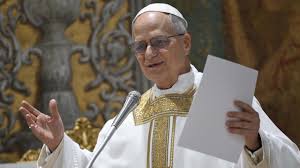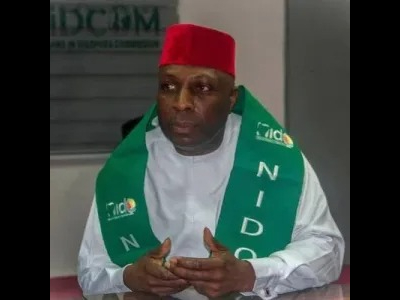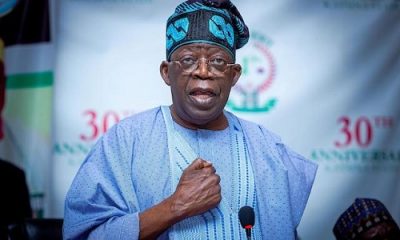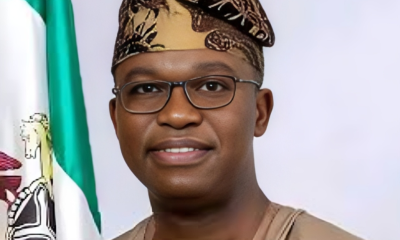Foreign News
SDGs: UN Chief Says Global Poverty Expected to be 7% by 2030

UN Secretary-General António Guterres says the world is moving away from achieving the Sustainable Development Goals (SDGs) as global poverty is expected to be at seven per cent by 2030, only marginally below the level in 2015.
Guterres said this at the opening of the Ministerial Segment of the High-Level Political Forum on Sustainable Development on Tuesday at the UN headquarters in New York.
The UN Correspondent reports that the Forum, which started on July 6 and will end on July 15, is intended to assess progress on the 2030 Agenda.
The secretary-general called on countries to be committed to ending poverty goal by implementing poverty alleviation programmes and the SDGs.
About half of the world’s countries now have poverty rates below three per cent and the world as a whole is not on track to achieve the target of less than three per cent of the world living in extreme poverty by 2030.
In the 25 years from 1990 to 2015, the extreme poverty rate dropped an average of a percentage point per year – from nearly 36 per cent to 10 per cent.
But the rate dropped only one percentage point in the two years from 2013 to 2015, according to World Bank 2018 report.
Guterres also called on world leaders to end the COVID-19 pandemic and to get the SDGs back on track, calling for decisive action in four key areas.
He said first, everyone, everywhere, must have access to COVID-19 vaccines, tests, treatments and support.
“The development and roll-out of vaccines, including through the global equity mechanism, the ACT-Accelerator and its COVAX facility, is offering hope.
“But there is uneven access to these tools, especially vaccines, around the world and within countries.
“A global vaccination gap threatens us all because as the virus mutates, it could become even more transmissible, or even more deadly.
“Pledges of doses and funds are welcome – but they are not enough and we need at least eleven billion doses to vaccinate 70 per cent of the world and end this pandemic.’’
Second, the secretary-general said the world needed urgent, ambitious climate action, including on finance and a promising movement for carbon neutrality is now taking shape.
According to him, by August, countries representing more than 65 per cent of harmful greenhouse gases and more than 70 per cent of the world economy will have committed to achieve net zero emissions.
“But we are still struggling to hold the global temperature increase to the 1.5-degree target of the Paris Agreement.
“If COP26 in Glasgow is to be a turning point, we need all countries to commit to achieve net zero by mid-century, and to present Nationally Determined Contributions aiming at a cut in global emissions by 45 per cent by 2030, compared to 2010 levels.
“Developing countries also need assurances that their climate ambition will be met with financial and technical support.
“That means delivering on the 100 billion dollars that developed countries agreed to mobilise annually for mitigation and adaptation by 2020.’’
In addition, he said the world should heed the lessons of crisis and invest in more equal and inclusive societies.
“This calls for every country to provide a foundation of opportunity for all by expanding access to universal health coverage, social protection, quality education and digital connectivity.
“We need to focus on the transformative impact of shifting power dynamics, through ambitious measures for gender equality and gender-balanced leadership in all areas, and targeted steps to ensure women’s economic inclusion.
“There can be zero tolerance towards any form of violence against women.’’
According to him, every national recovery plan should include significant investment in the care economy and infrastructure.
He said this would alleviate the burden of unpaid care work, enabling women to join the labour force, while creating sustainable, green jobs.
“We need a dedicated focus on employment and decent work – boosting the availability of jobs and training for young people; improving labour conditions and rights; and supporting people in the informal sector.
“We need to invest in lifelong education and re-skilling, to enable a smooth transition to sustainability and take advantage of the potential for job creation,’’ the secretary-general said.
According to him, the underpinning progress in these three areas is financing for development. (NAN)
Foreign News
Pope Leo Prays for Victims of Austrian School Shooting

Pope Leo XIV said on Wednesday that he was praying for the victims of the mass shooting in a school in the Austrian city of Graz.
“I would like to express my prayers for the victims of the tragedy at the Graz school,” Leo said during his weekly audience in the Vatican.
Leo added that he is keeping the families, teachers, and fellow pupils in his thoughts.
According to police, a 21-year-old former pupil at the school entered the grounds on Tuesday and opened fire, killing 10 pupils aged between 15 and 17 as well as a teacher.
He then shot himself.
Eleven people remain in the hospital, most of them in intensive care.
All are now reported to be in a stable condition.
Graz, in south-eastern Austria, is home to around 300,000 people. (dpa/NAN)
Foreign News
NiDO-Worldwide Appoints New Coordinating Chairman

The Nigerians in Diaspora Organisation (NiDO)-Worldwide has appointed Mr Chibuzo Ubochi, as its new Coordinating Chairman of NIDO-Europe.
Ubochi succeeds Dr Victor Ubani, the Chairman of NIDO Americas and outgoing coordinating chairman of NiDO-Worldwide.
Ubani disclosed this in a statement issued on Tuesday, against backdrop of the end of his tenure as coordinating chairman and inauguration of Ubochi’s tenure as the new chairman of the organisation.
He congratulated Ubochi over his recent electoral victory where he emerged chairman of the organisation, saying it was a closely contested NIDO-Europe election against Dr Johnson Odibo.
According to him, the process which was conducted with robust participation, ushered in a new era for NIDO-Europe.
Ubani said: “It is one marked by renewed strength, unity and purpose. I write in my capacity as the outgoing Coordinating Chairman of NIDO-Worldwide, having had the honour of serving in this rotational role on behalf of the Americas.
“I am deeply grateful for the cooperation and commitment demonstrated by our continental bodies throughout my tenure.
“Together, we pursued the vision of a more effective, united and relevant NIDO across all regions. I believe we made notable progress in advancing our collective mandates.
“As is the custom within our global structure, which comprises five continental bodies, I will now be handing over the rotational leadership of the Coordinating Chairmanship to the current Chairman of NIDO Europe, Sir Chibuzo Ubochi”.
Ubani explained that he had observed Ubochi’s leadership as Chairman of NIDO UK South and his previous tenure as Legal Adviser to the NIDO-Worldwide Coordinating Platform, to express confidence in the latter’s ability to lead the organisation.
“I am confident in his capacity to fulfill this responsibility with vision, integrity and diplomatic skill.
“He is well acquainted with the complexities of our global structure and is well-positioned to continue strengthening and advancing a more focused and impactful NIDO Worldwide.
“As he assumes this role, I urge all continental chairs, executives and members to extend the same cooperation and collegiality accorded me to him.
“The task ahead requires a united front, focused energy and shared commitment free from unnecessary distractions and geared solely toward the progress of our global diaspora, and the development of our homeland,” he said. (NAN)
Foreign News
U.S. Imposes Sanctions on Iranian Money Laundering Network

The U.S. Treasury Department has announced sanctions against more than 30 individuals and companies accused of helping Iran evade sanctions and launder billions from oil and petrochemical sales to fund its nuclear and missile programmes.The sanctioned network operated as a system of “shadow banking” involving front companies in places like Hong Kong and the United Arab Emirates, the department said in a statement.
The goal, it said, was to bypass existing sanctions, obscure the origin of oil proceeds, and funnel money into military-linked projects. The new sanctions freeze any U.S.-based assets of the targeted entities and bar U.S. citizens from doing business with them.The measures also complicate the ability of those sanctioned to operate internationally, especially in transactions involving U.S. dollars.Washington and Tehran are engaged in negotiations over the future of Iran’s nuclear programme.U.S. President Donald Trump has repeatedly said he “aims to prevent Iran from developing nuclear weapons”.Tehran insists its nuclear activities are purely for civilian purposes.Trump has warned that military action remains on the table if diplomacy fails. (dpa/NAN)






























